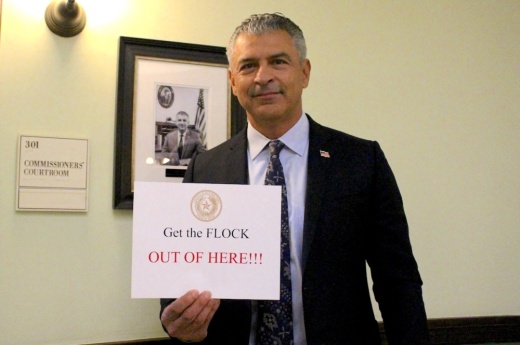The court is debating adding additional ALPRs from Flock, terminating their contract with the company altogether or finding a middle ground.
What’s happening?
The court discussed two items regarding the ALPR contract during a meeting Aug. 19.
Commissioner Walt Smith sponsored an item to execute a contract with Flock for four additional cameras, originally brought to court and unanimously approved in February. Because of a clerical error, the item had to be reapproved with a new amended contract.
That new contract was brought back to court in late July but has yet to be approved due to recent conversations regarding the camera provider and ALPRs in general.
Judge Ruben Becerra sponsored an item to terminate all Flock Safety contracts, which would include current and pending contracts such as the agreement Smith sponsored.
Hays County currently has five operating ALPRs and one pending ALPR across the region.
Those for, against
The debate comes from some voices concerned over data privacy and government interference, while others believe the cameras would help the Hays County Sheriff's Office with their crime-solving operations.
Flock Safety has faced recent controversy regarding sharing information with outside law enforcement agencies, such as Immigrations and Customs Enforcement.
A representative from Flock Safety said during Aug. 19 public comment that the company does not sell data, but the decision is up to the county.
During a July 29 Commissioners Court meeting, HCSO Capt. Shane Smith said the department shares information with law enforcement agencies if they request it, as previously reported by Community Impact.
The ALPRs do not have face-recognizing technology; however, Becerra said he believes license plates have enough information to track individuals down.
“The idea that you’re capturing a microsecond—realize that that microsecond is a bread crumb trail along [I-35] from Brownsville all the way to Dallas, or from Laredo all the way to Houston,” he said at the Aug. 19 meeting.
However, other commissioners said the cameras could be a tool for officers under the HCSO.
Additionally, Commissioner Morgan Hammer said the court’s decision should also consider the balance between local Hays County law enforcement and varying community opinions.
“We represent the people of Hays County. We want to make sure we do our due diligence to them and also to our law enforcement,” she said. “Sheriff [Anthony] Hipolito hasn’t done anything to make us distrust him ... and he is in support of this. ... I’ve said this from the start—I support our sheriff, so what is it going to take for us to come to concessions on these cameras?"
Becerra said he is open to a compromise on the cameras if the county has more control over the ALPR operations and data.
“A potential compromise in my heart would be keep the camera system local, put up our own camera system for our own local law enforcement, and not have these national companies with terrible reputations tracking people—whether it be a public safety issue, whether it be a personal health issue or a private privacy issue,” he said during the meeting. “If we create a camera system exclusively for our local law enforcement to do all these wonderful ideas, I think that might be a good compromise."
Looking ahead
A specific date for the next ALPR discussion has been set; however, the Hays County Commissioners Court will meet Sept. 2 for their next meeting.
Read more about how we got here with previous coverage from Community Impact.





